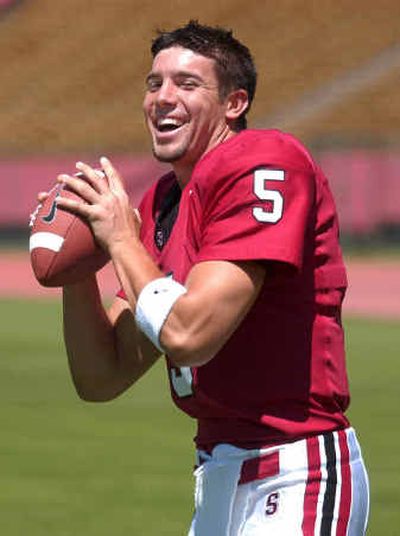Passing the test

Finding people to praise the talent of Stanford quarterback Trent Edwards has never been a problem — including those who haven’t yet seen him play.
“Even before I came here I had heard so much about Trent, and how great he was going to be and the expectations that everyone here had for him,” recalls Cardinal wide receiver Evan Moore, who came to Stanford one year after Edwards. “He makes passes sometimes that’s got some people at practice looking at each other like, ‘Wow.’
“He can throw the ball a mile. We’ll take off, he’ll hold it for five seconds then throw it and he still overthrows us sometimes.”
Edwards came to Stanford — the quarterback said he was actually a Cal fan growing up in Los Gatos, Calif. — as a golden boy, the high school’s best pure passer and a resident on the wish lists of programs across the nation.
But hype is one thing and production is another, a lesson Edwards learned the hard way as a redshirt freshman starting four games and playing in four more for the Cardinal in 2003. Edwards suffered shoulder and thigh injuries during the season, and threw nine interceptions with four touchdowns.
This year, as a sophomore starter who was handed the reins to the Stanford offense in the off-season, he’s setting out to establish himself among the upper echelon of Pac-10 quarterbacks. Already, Edwards has tossed seven touchdowns while giving up four interceptions. Stanford has been called by some the surprise team of the conference, coming to Washington State this Saturday with a 3-2 record and a conference win over Washington.
The prized recruit is feeling less like a savior-to-be and more like a signal-caller.
“I feel more comfortable having a lot of games under my belt,” Edwards said. “The more snaps you get under center, the more comfortable I get. I just have to play in rhythm and get the ball in guys’ hands.
“Last year was kind of tough. Offensively we weren’t getting much going and this year I think everyone on the team knows their role and knows their assignments. Coach has been real clear about what he expects from each player.”
What the coach — Buddy Teevens, in his third year at the helm in Palo Alto — expects is that his team will throw the football to win games. That means, at least in part, that as Edwards goes, so go the Cardinal.
As such, the sophomore quarterback spent the off-season working to bulk up, adding about 10 pounds to his 6-foot-4 frame. Edwards said that after the injuries of 2003, he’s more prepared to face the rigors of a college football slate.
“You got to be able to maintain in an 11-game season and your body’s got to hold up,” Edwards said. “That’s part of the quarterback position. You get hit. But you’ve got to be able to get stronger and get better physically each year to be a competitive quarterback.”
In part because of Edwards’ youth, and especially because of the inexperience across the board on offense (seven starters are sophomores), Teevens has installed a fairly simple passing scheme that allows his talented passer to make the tough throws without having to deal with a complicated system.
Teevens, having built his reputation as an offensive coordinator at Illinois and Florida, is keeping close watch on his pupil — sitting in on at least one quarterback meeting most weeks.
“He knew the position was his, and I think the in terms of age physical maturation, plus the emotional and intellectual maturation as well, he’s shown a leadership and a charisma that have helped offensively,” Teevens said. “He’s a tough guy, taken some shots and gotten back up and continued to play. I’ve seen progress each step of the way.”
Moore, a 6-7 wideout who doubles as a basketball player for the Cardinal, calls Edwards one of the most humble people he has known.
“He’ll never mention himself and what he’s done,” Moore said. “If anyone else wants to tell him how great he’s doing, he kind of laughs and changes the subject.”
So it’s not much of a surprise that Edwards says his high school experience is quickly fading into the background. But whether Edwards is willing to admit it or not, two things have not changed much — his talent and his team’s reliance on him to lead the way.
“Each year you kind of forget more and more about your high school accolades,” Edwards said. “It’s nice to be recruited and everything, but the more games you play in a Stanford jersey, the less you’re associated with your high school career.
“We’re not really a power team. We’re willing to throw the ball 30 or 40 times, whatever it takes to get the job done and to get the win.”